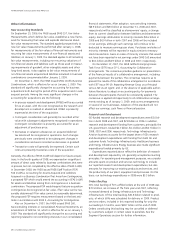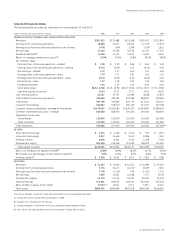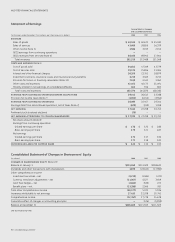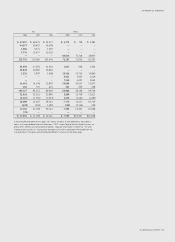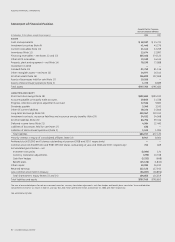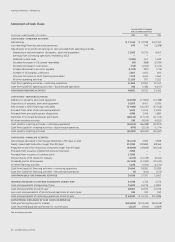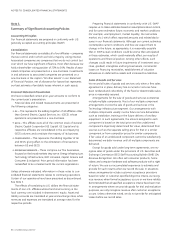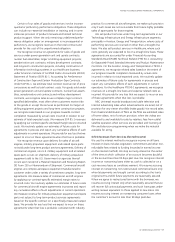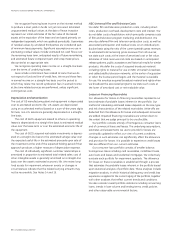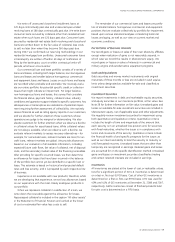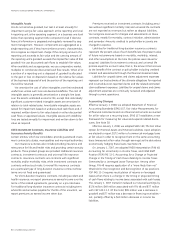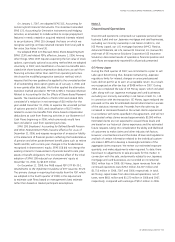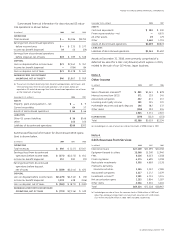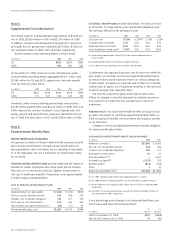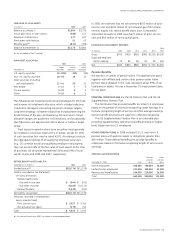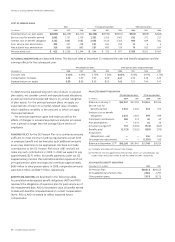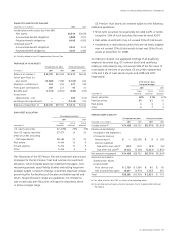GE 2008 Annual Report Download - page 59
Download and view the complete annual report
Please find page 59 of the 2008 GE annual report below. You can navigate through the pages in the report by either clicking on the pages listed below, or by using the keyword search tool below to find specific information within the annual report.ge 2008 annual report 57
notes to consolidated financial statements
Certain of our sales of goods and services involve inconse-
quential or perfunctory performance obligations. These obligations
can include non-essential installation or training, and in some
instances provision of product manuals and limited technical
product support. When the only remaining undelivered perfor-
mance obligation under an arrangement is inconsequential or
perfunctory, we recognize revenue on the total contract and
provide for the cost of the unperformed obligation.
We recognize revenue on agreements for sales of goods and
services under power generation unit and uprate contracts;
nuclear fuel assemblies; larger oil drilling equipment projects;
aeroderivative unit contracts; military development contracts;
and long-term construction projects, including construction of
information technology systems in our Healthcare business,
under American Institute of Certified Public Accountants (AICPA)
Statement of Position (SOP) 81-1, Accounting for Performance
of Construction-Type and Certain Production-Type Contracts.
Under SOP 81-1, we estimate total contract revenue net of price
concessions as well as total contract costs. For goods sold under
power generation unit and uprate contracts, nuclear fuel assem-
blies, aeroderivative unit contracts and military development
contracts, we recognize sales as we complete major contract-
specified deliverables, most often when customers receive title
to the goods or accept the services as performed. For larger oil
drilling equipment projects and long-term construction projects,
we recognize sales based on our progress towards contract
completion measured by actual costs incurred in relation to our
estimate of total expected costs. We measure SOP 81-1 revenues
by applying our contract-specific estimated margin rates to incurred
costs. We routinely update our estimates of future costs for
agreements in process and report any cumulative effects of such
adjustments in current operations. We provide for any loss that we
expect to incur on these agreements when that loss is probable.
We recognize revenue upon delivery for sales of aircraft
engines, military propulsion equipment and related spare parts
not sold under long-term product services agreements. Delivery of
commercial engines, non-U.S. military equipment and all related
spare parts occurs on shipment; delivery of military propulsion
equipment sold to the U.S. Government or agencies thereof
occurs upon receipt of a Material Inspection and Receiving Report,
DD Form 250 or Memorandum of Shipment. Commercial aircraft
engines are complex aerospace equipment manufactured to
customer order under a variety of sometimes-complex, long-term
agreements. We measure sales of commercial aircraft engines
by applying our contract-specific estimated margin rates to
incurred costs. We routinely update our estimates of future costs
for commercial aircraft engine agreements in process and report
any cumulative effects of such adjustments in current operations.
We measure revenue for military propulsion equipment and spare
parts not subject to long-term product services agreements
based on the specific contract on a specifically-measured output
basis. We provide for any loss that we expect to incur on these
agreements when that loss is probable; consistent with industry
practice, for commercial aircraft engines, we make such provision
only if such losses are not recoverable from future highly probable
sales of spare parts for those engines.
We sell product services under long-term agreements in our
Technology Infrastructure and Energy Infrastructure segments,
principally in Aviation, Energy and Transportation, where costs of
performing services are incurred on other than a straight-line
basis. We also sell product services in Healthcare, where such
costs generally are expected to be on a straight-line basis. These
agreements are accounted for under Financial Accounting
Standards Board (FASB) Technical Bulletin (FTB) 90-1, Accounting
for Separately Priced Extended Warranty and Product Maintenance
Contracts. For the Aviation, Energy and Transportation FTB 90-1
agreements, we recognize related sales based on the extent of
our progress towards completion measured by actual costs
incurred in relation to total expected costs. We routinely update
our estimates of future costs for agreements in process and
report any cumulative effects of such adjustments in current
operations. For the Healthcare FTB 90-1 agreements, we recognize
revenues on a straight-line basis and expense related costs as
incurred. We provide for any loss that we expect to incur on any
of these agreements when that loss is probable.
NBC Universal records broadcast and cable television and
Internet advertising sales when advertisements are aired, net of
provision for any viewer shortfalls (make goods). We record sales
from theatrical distribution of films as the films are exhibited; sales
of home videos, net of a return provision, when the videos are
delivered to and available for sale by retailers; fees from cable/
satellite operators when services are provided; and licensing of
film and television programming when we make the material
available for airing.
GECS Revenues from Services (Earned Income)
We use the interest method to recognize income on all loans.
Interest on loans includes origination, commitment and other non-
refundable fees related to funding (recorded in earned income
on the interest method). We stop accruing interest at the earlier
of the time at which collection of an account becomes doubtful
or the account becomes 90 days past due. We recognize interest
income on nonearning loans either as cash is collected or on a
cost-recovery basis as conditions warrant. We resume accruing
interest on nonearning, non-restructured commercial loans only
when (a) payments are brought current according to the loan’s
original terms and (b) future payments are reasonably assured.
When we agree to restructured terms with the borrower, we
resume accruing interest only when reasonably assured that we
will recover full contractual payments, and such loans pass under-
writing reviews equivalent to those applied to new loans. We
resume accruing interest on nonearning consumer loans when
the customer’s account is less than 90 days past due.



